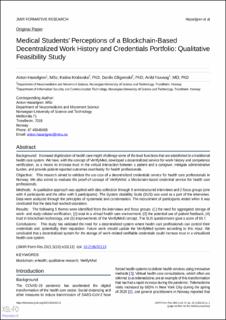| dc.description.abstract | Background: Increased digitization of health care might challenge some of the trust functions that are established in a traditional health care system. We have, with the concept of VerifyMed, developed a decentralized service for work history and competence verification, as a means to increase trust in the virtual interaction between a patient and a caregiver, mitigate administrative burden, and provide patient-reported outcomes seamlessly for health professionals. Objective: This research aimed to validate the use case of a decentralized credentials service for health care professionals in Norway. We also aimed to evaluate the proof-of-concept of VerifyMed, a blockchain-based credential service for health care professionals. Methods: A qualitative approach was applied with data collection through 9 semistructured interviews and 2 focus groups (one with 4 participants and the other with 5 participants). The System Usability Scale (SUS) was used as a part of the interviews. Data were analyzed through the principles of systematic text condensation. The recruitment of participants ended when it was concluded that the data had reached saturation. Results: The following 5 themes were identified from the interviews and focus groups: (1) the need for aggregated storage of work- and study-related verification, (2) trust in a virtual health care environment, (3) the potential use of patient feedback, (4) trust in blockchain technology, and (5) improvements of the VerifyMed concept. The SUS questionnaire gave a score of 69.7. Conclusions: This study has validated the need for a decentralized system where health care professionals can control their credentials and, potentially, their reputation. Future work should update the VerifyMed system according to this input. We concluded that a decentralized system for the storage of work-related verifiable credentials could increase trust in a virtualized health care system. | en_US |

